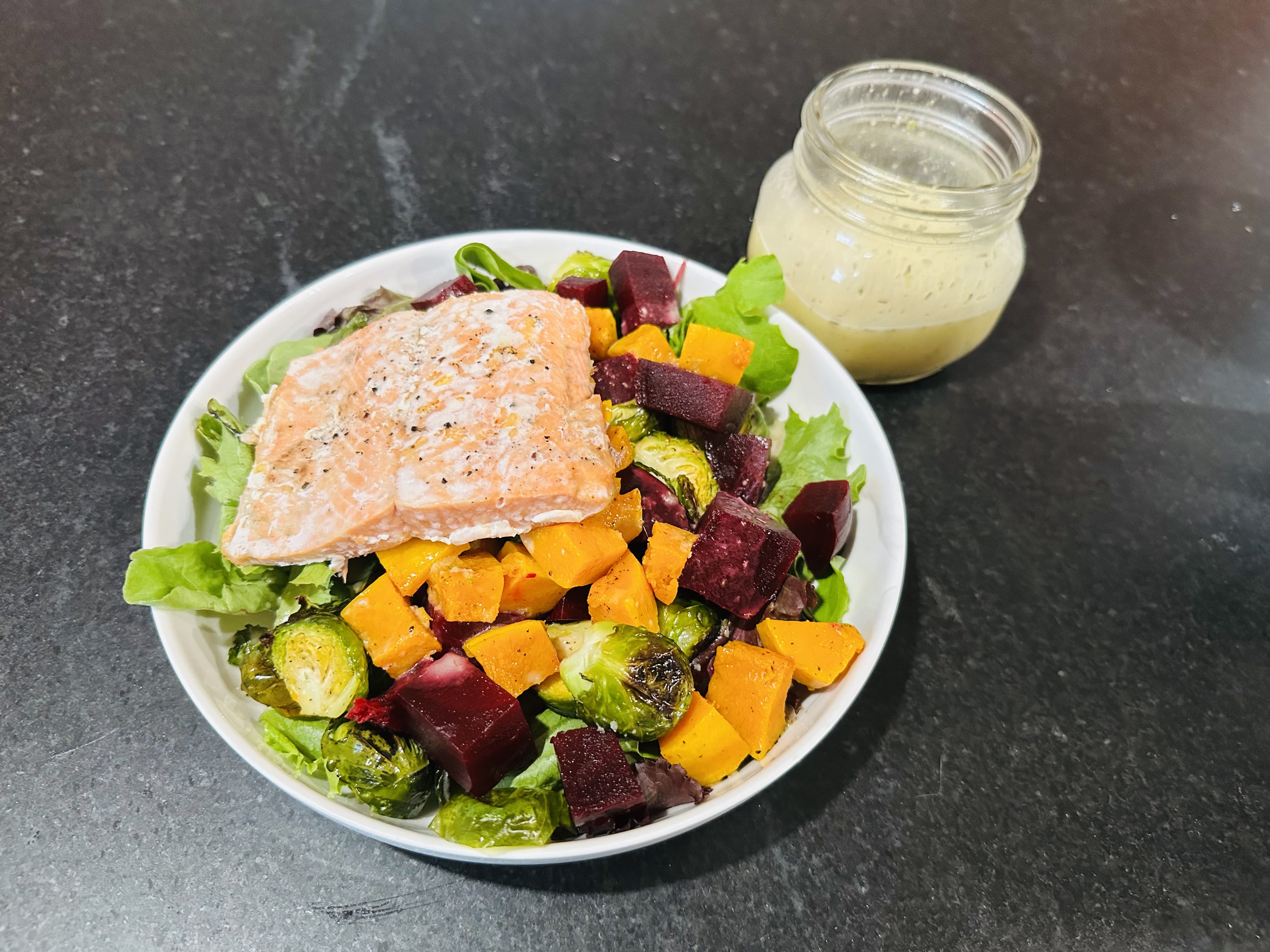

Salads can be one of the easiest ways to boost your veggie intake. A good salad isn’t just a side dish or an appetizer—it’s a nutrient powerhouse packed with fiber, vitamins, minerals, and antioxidants. Leafy greens support digestion and satiety, colorful veggies provide different phytonutrients, and adding a quality protein (like chicken, salmon, or hard-boiled eggs) helps balance blood sugar and keep you fueled for the hard work you put into your day–both in and out of the gym.
In my last recipe post on AIP chicken salad, I shared a bit about my autoimmune journey and how cooking from scratch and finding balanced recipes has been both a challenging and rewarding part of my journey. When you’re navigating AIP, paleo, or other dietary restrictions, one of the first lessons you learn is that what goes into your body matters. That means learning to read food labels, understanding ingredients, and making swaps that support healing instead of adding to inflammation.
Store-bought salad dressings are often loaded with additives, seed oils, preservatives, and hidden sugars. While they might taste good, they can easily turn a fresh, nutrient-packed salad into something heavy and inflammatory. One of the first nutrition practices we talk about with members is label reading—choose products with short ingredient lists made of whole, recognizable foods. If you can’t pronounce it, your body probably doesn’t need it.
Making your own dressings ensures you’re fueling with quality ingredients. You control the oil, the sweetener, and the seasoning—and you can keep things AIP, paleo, gluten-free, or dairy-free without sacrificing flavor.
The idea of making salad dressings from scratch can be overwhelming! These 3 quick and easy salad dressings are tangy, fresh, and versatile enough to pair with just about any salad combination. Each one comes together in minutes, can be stored in the fridge for up to a week, and adds that extra zing that keeps salads exciting. Stuck on the same salad? No worries! I’ve also included salad suggestions for each dressing. *Please note that there are salad pairing suggestions below with ingredients that are not AIP compliant.
Whether you’re following AIP or just looking to eat more whole foods, small changes like making your own salad dressing can have a big impact. It’s not about perfection—it’s about consistency and choosing ingredients that help your body thrive. A nourishing salad topped with one of these dressings is proof that healthy food can be flavorful, simple, and deeply satisfying.
For all three recipes: add everything except the oil to a food processor or use an immersion blender. Blend until smooth. Then, slowly add in the oil while blending to create a creamy emulsion. Shake well before each use, and store in the fridge in an airtight container for 5–7 days. Shake well before using.
Bright, zesty, and slightly sweet. This one brings sunshine to your plate with lemon, lime, and orange. The honey balances the acidity, making it light and refreshing.
Pairs well with:
What you need:
Nutritional Highlights: Rich in vitamin C from lemon, lime, and orange juice to support immune health and collagen production. Honey adds natural sweetness while avocado oil provides healthy monounsaturated fats for satiety and hormone support.
Tangy with a subtle sweetness. Apple cider vinegar is known for its gut-supporting benefits, and when paired with honey and thyme, it makes for a clean, herby dressing that livens up any simple salad.
Pairs well with:
What you need:
Nutritional Highlights: Apple cider vinegar may support digestion and gut health by promoting stomach acid balance. Thyme adds antioxidants and anti-inflammatory compounds, while avocado oil brings heart-healthy fats.
Rich, smooth, and slightly sweet. The balsamic base with garlic, oregano, and basil gives it a Mediterranean feel. This one’s a little heartier and works beautifully with most toppings.
Pairs well with:
What you need:
Nutritional Highlights: Balsamic vinegar is packed with polyphenols (antioxidants that fight oxidative stress). Garlic and herbs like oregano and basil offer antimicrobial and anti-inflammatory benefits, while olive oil delivers omega-9 fatty acids that support cardiovascular health.